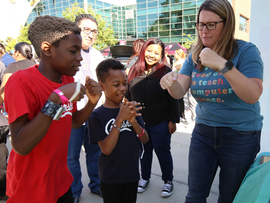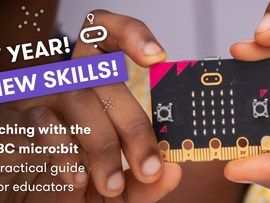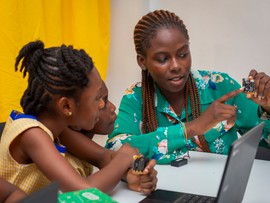Life on Land teaching guide
New teaching resource published to inspire students to help protect life on land
We have published a new teaching resource, Life on Land. You can use it as a basis for celebrating World Wildlife Day with your students on Thursday 3 March 2022. Or use the resource to inspire your students to enter the do your :bit micro:bit global challenge with solutions related to the UN's Global Goal 15, Life on Land.

The resource is suitable for children aged eight and above and promotes talk on topics such as:
- preventing the loss of plant and animal species and damage to ecosystems
- protecting forests and rivers
- stopping the ‘desertification’ caused by droughts
Last year’s inventive do your :bit entries
In 2021, students from around the world came up with innovative tech solutions to protect the environment. Here are some of the ideas they submitted to the do your :bit challenge:
A safe environment for bees
A safe environment for bees
Emily, Melanie and Valentina used their micro:bit to protect bees.
The girls, who won the paper prototype category for 8 to 14-year-olds in Latin America, made an extensive model to show how their idea would work. Their proposal measures temperature and humidity, and counts the number of bees visiting a planted area. In addition, sensors observe the transport of pollen from one flower to another.
Find out more about a safe environment for bees
Smart plant wall
Jingyu Xiao introduces his smart plant wall
Jingyu Xiao in China created a smart plant wall to increase the amount of greenery in his city, Shenzhen.
There are many typhoons in Shenzhen so Jingyu Xiao designed his plant wall to automatically retract or extend according to the weather forecast. He also added an automatic irrigation system.
Find out more about the smart plant wall
The ‘Angry Tree’
Mustafa and Mand in Iraq created the ‘Angry Tree’
Mustafa and Mand in Iraq created the ‘Angry Tree’, a device that monitors trees and alerts humans to issues such as dry soil, high heat, and attempted tree felling.
Their invention allows trees to inform people of problems using either a mobile phone or email. The boys used two BBC micro:bits in their project, one for monitoring and alerting, and another to help provide optimal conditions for the trees through automatic watering and cooling.
do your :bit
The do your :bit challenge adds social purpose to digital learning and allows students to apply their digital skills to real world solutions. The competition is open until 15 July 2022.


